
UBS-monthly review_watermark
.pdf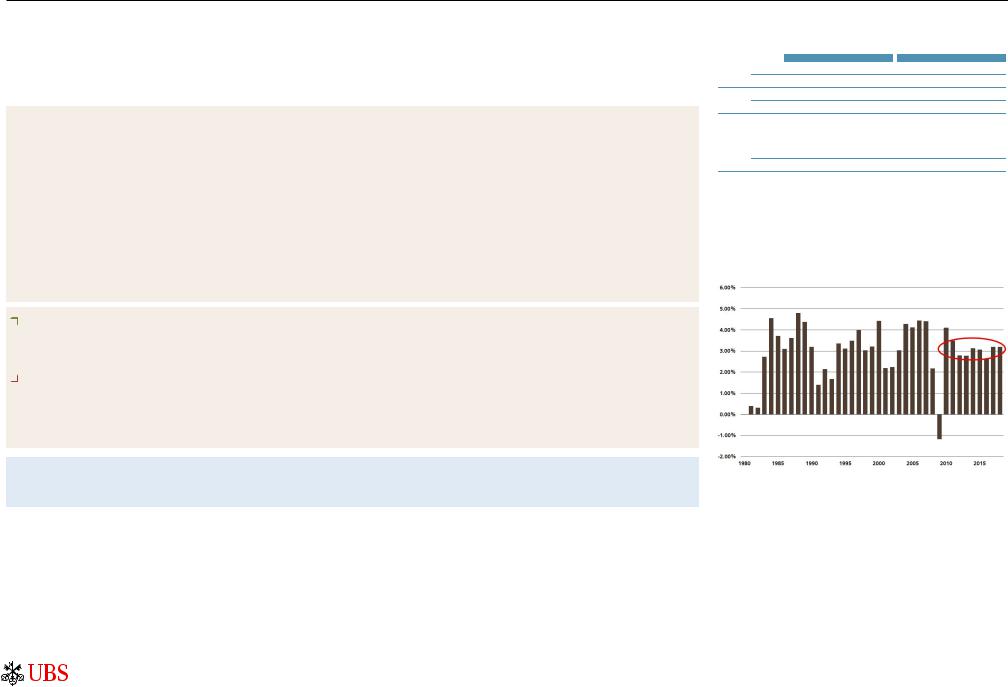
vk.com/id446425943
Global economic outlook - Summary
Key points
•Global growth has been very stable around trend for an unusually long time. Risks to that stability are growing as a result of trade uncertainty.
•Domestic demand remains relatively good in most economies. Consumer goods production is generally strong. Weakness in investment spending slowed growth in 2018, and disproportionately hurt trade. That had started to stabilize.
•The risk of a global recession in 2019 remains relatively low, but a period of below-trend growth seems increasingly likely.
CIO view (Probability: 50%*) |
Global growth around trend or slightly below |
•Labor market strength continues in most major economies, giving consumers better income (via increased employment, increased wages, or both). Global unemployment is at or near a 40-year low. Stimulus measures in China are prioritizing growth. Consumers have to-date been largely unaffected by political uncertainty.
•Manufacturing data support the idea of relatively strong consumption. Any weakness in manufacturing has been focused geographically or by sector (investment goods rather than consumer goods).
•As trade risks started to fade during the first quarter, investment and manufacturing data started to stabilize (consistent with trend growth). The recent escalation of trade tensions raises risks to that. The longer the uncertainty around trade lasts, the greater the drag on economic performance. This means that trade could still weaken growth, even if ultimately deals are done.
•Underlying inflation trends remain relatively benign although the stronger labor markets should be monitored. Core producer price inflation is an important signal of corporate pricing power. So far, profit margins rather than inflation seem to be bearing the burden of higher costs.
Positive scenario (Probability: 20%*) |
Growth at or above trend |
•Trade uncertainty declines, allowing a significant increase in investment. Labor markets continue to support consumer demand.
•Fiscal stimulus in China has positive spillover effects into Asia.
Negative scenario (Probability: 30%*) |
Political damage to growth |
•Trade taxes rise significantly and act as a fiscal drag on growth. Increased taxes lead to the cancellation (rather than just the postponement) of investment.
•The growth slowdown from these factors leads to a reassessment of employment. Job losses undermine consumer spending.
*Scenario probabilities are based on qualitative assessment.
Key dates
June 28-29 |
G20 summit in Osaka, Japan |
Can trend growth continue?
UBS estimates and forecasts
|
|
|
Real GDP growth in % |
|
|
Inflation in % |
|
|
|||
|
|
2016 |
2017 |
2018 |
2019F |
2020F |
2016 |
2017 |
2018 |
2019F |
2020F |
Americas |
US |
1.6 |
2.2 |
2.9 |
2.8 |
2.0 |
1.3 |
2.1 |
2.4 |
1.5 |
1.8 |
|
Canada |
1.1 |
3.0 |
1.9 |
1.2 |
1.8 |
1.4 |
1.6 |
2.2 |
1.9 |
2.0 |
|
Brazil |
-3.3 |
1.1 |
1.1 |
1.0 |
2.2 |
8.7 |
3.4 |
3.7 |
3.8 |
3.7 |
Asia/Pacific |
Japan |
0.6 |
1.9 |
0.8 |
1.3 |
1.3 |
-0.1 |
0.5 |
1.0 |
1.0 |
2.0 |
|
Australia |
2.8 |
2.4 |
2.8 |
1.9 |
2.4 |
1.3 |
1.9 |
1.9 |
1.5 |
2.0 |
|
China |
6.7 |
6.8 |
6.6 |
6.2 |
6.1 |
2.0 |
1.6 |
2.1 |
2.3 |
1.9 |
|
India |
8.2 |
7.2 |
6.8 |
6.9 |
7.2 |
4.5 |
3.6 |
3.4 |
3.5 |
4.0 |
Europe |
Eurozone |
1.9 |
2.5 |
1.8 |
1.3 |
1.3 |
0.2 |
1.5 |
1.8 |
1.2 |
1.4 |
|
Germany |
2.2 |
2.5 |
1.5 |
1.0 |
1.3 |
0.4 |
1.7 |
1.9 |
1.4 |
1.7 |
|
France |
1.1 |
2.3 |
1.6 |
1.3 |
1.4 |
0.3 |
1.2 |
2.1 |
1.1 |
1.3 |
|
Italy |
1.2 |
1.7 |
0.8 |
0.3 |
0.8 |
0.0 |
1.3 |
1.2 |
0.6 |
0.4 |
|
Spain |
3.2 |
3.0 |
2.6 |
2.2 |
2.0 |
-0.3 |
2.0 |
1.7 |
0.9 |
1.5 |
|
UK |
1.8 |
1.8 |
1.4 |
1.4 |
1.2 |
0.7 |
2.7 |
2.5 |
2.0 |
2.2 |
|
Switzerland |
1.6 |
1.7 |
2.5 |
1.3 |
1.6 |
-0.4 |
0.5 |
0.9 |
0.5 |
0.9 |
|
Russia |
0.3 |
1.6 |
2.3 |
1.0 |
2.1 |
7.0 |
3.7 |
2.9 |
4.8 |
3.8 |
World |
|
3.3 |
4.0 |
3.8 |
3.5 |
3.6 |
2.7 |
2.7 |
3.0 |
2.9 |
2.8 |
Source: UBS, as of 20 June 2019
Forecasts and estimates are current only as of the date of this publication, and may change without notice.
The great Great Moderation
Global growth has been very stable in the recent past, around trend
Source: Oxford Economic Forecasting, via Haver
For further information please contact Regional CIO Switzerland Daniel Kalt, or CIO Chief Economist Eurozone Ricardo Garcia, 11
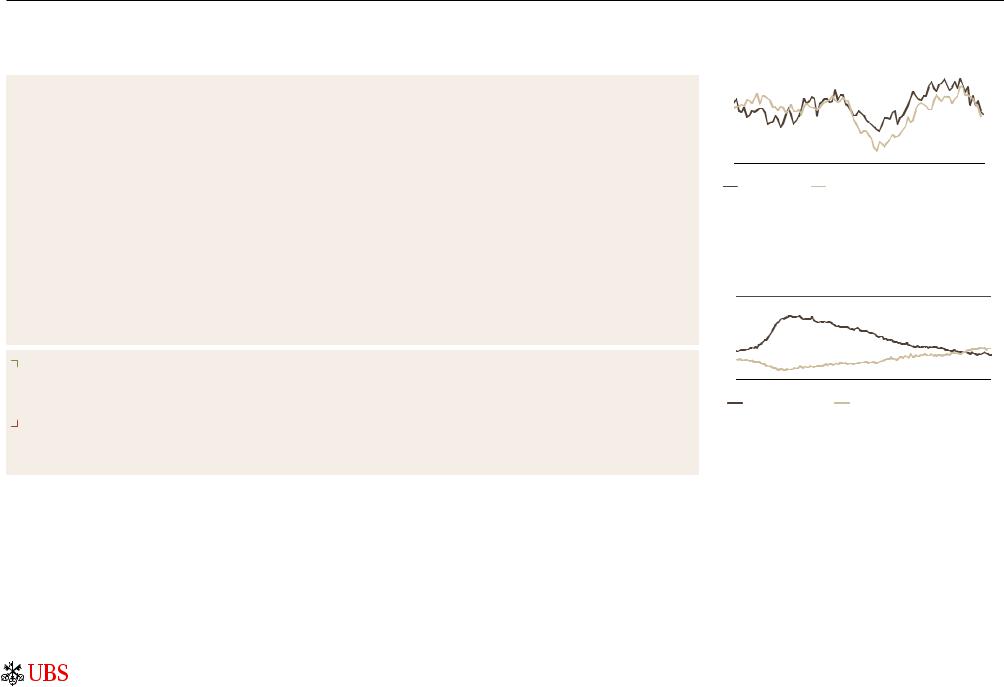
vk.com/id446425943
US economy - US growth heading back toward trend
Key points
•Economic growth should slow toward trend as fiscal stimulus fades
•Core inflation should remain near the Fed's 2% target.
•Policy uncertainty creates downside risks.
CIO view (Probability: 60%*) |
Moderate expansion |
•GDP expanded at a 3.2% pace in 1Q19. As fiscal stimulus fades, growth should slow toward a more sustainable pace, in line with the 2% potential growth rate.
•While demand for workers remains strong, job growth is likely to slow as most people who want a job already have one.
•Rising wage income and strong consumer sentiment should support robust growth in consumer spending.
•Strong profits and labor shortages will encourage businesses to invest. However, political uncertainty, especially on trade, will act as a constraint.
•Manufacturing output has surprised to the downside year-to-date. Excess inventories, softening auto sales, and weaker external demand are negatives.
•Residential investment has declined in recent quarters. Mortgage rates are down from their highs, and demand for housing should be supported by the strong labor market, limiting further downside risk.
•Core inflation, which excludes food and energy prices, has slowed recently but should not fall too far below the Fed's 2% target.
•The Fed shifted to a more dovish stance at its policy meeting on 19 June. We now expect a 50 basis point rate cut in July.
•With support from fiscal policy fading, further escalation of trade disputes or another government shutdown could pose a more serious threat to the recovery.
Positive scenario (Probability: 15%*) |
Strong expansion |
•US real GDP grows above 3%, propelled by an accommodative monetary policy, loose fiscal policy, strong household spending, and breakthroughs in trade negotiations. Inflation overshoots the Fed's 2% target, potentially leading the central bank to raise rates beyond neutral.
Negative scenario (Probability: 25%*)
• US growth stumbles. Trade disputes, political uncertainty, and tighter financial conditions weigh on business investment and consumer spending. The Fed cuts rates.
*Scenario probabilities are based on qualitative assessment.
Key dates |
|
Jun 28 |
Personal income and spending, PCE deflator for May |
Jul 1 |
ISM manufacturing PMI for June |
Jul 3 |
ISM nonmanufacturing index for June |
Jul 5 |
Labor report for June |
|
|
Manufacturing sector is struggling
Manufacturing PMI, and industrial production y/y change in %
65 |
|
|
|
|
|
|
|
9 |
60 |
|
|
|
|
|
|
|
6 |
55 |
|
|
|
|
|
|
|
3 |
50 |
|
|
|
|
|
|
|
0 |
45 |
|
|
|
|
|
|
|
-3 |
40 |
|
|
|
|
|
|
|
-6 |
2011 |
2012 |
2013 |
2014 |
2015 |
2016 |
2017 |
2018 |
2019 |
Manufacturing PMI |
Industrial production (right scale) |
|
|
|||||
Source: Bloomberg, UBS, as of 12 June 2019
PMI = Purchasing managers' index
More job openings than people to fill them
Unemployed workers and job openings, in millions
20
15
10
5 |
|
|
|
|
|
|
0 |
|
|
|
|
|
|
2007 |
2009 |
2011 |
2013 |
2015 |
2017 |
2019 |
Unemployed workers |
JOLTS job openings |
|
|
|||
Source: Bloomberg, UBS, as of 12 June 2019
For further information please contact US economist Brian Rose, brian.rose@ubs.com 12
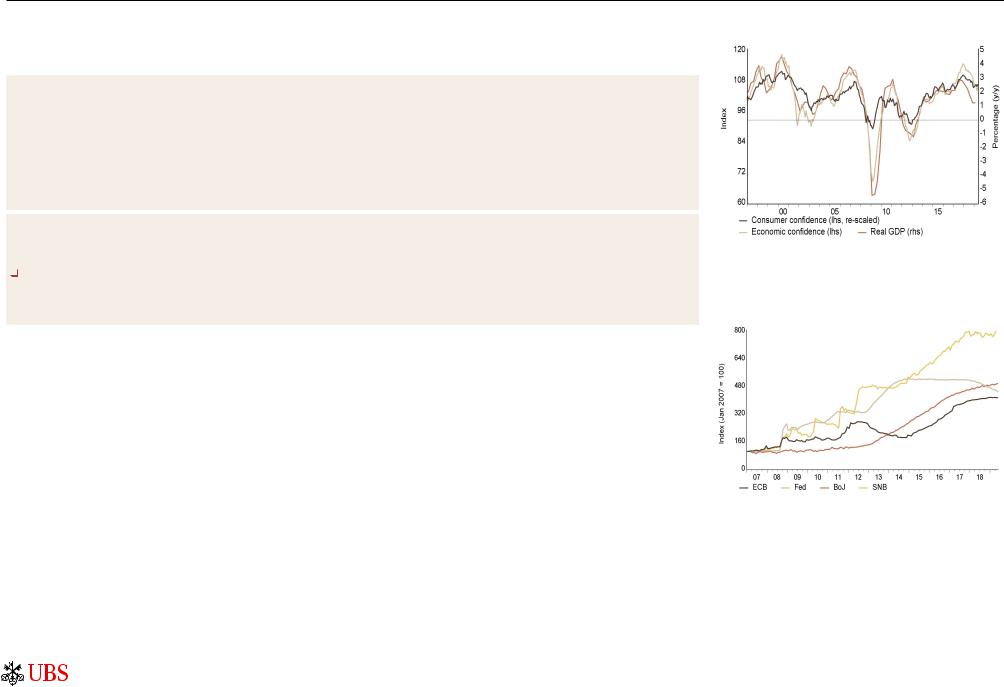
vk.com/id446425943
Eurozone economy - Moderate growth with downside risks
Key points
•We expect economic growth in the Eurozone to remain stable, subject to trade tensions.
•Inflation is set to move moderately lower on base effects.
•We expect the ECB to remain in wait-and-see mode with regards to the trade war.
CIO view (Probability: 60%*) |
Growth outlook subject to trade uncertainties |
•Activity is set to remain stable at moderate levels as long as trade uncertainties remain. In the event of a further significant escalation, growth is likely to turn out lower than expected. The ECB is still in a wait-and-see mode until more clarity emerges from the global trade spat. We think the central bank may start raising rates in September 2020 at the earliest.
•In Germany, the fiscal stimulus measures should help stabilize the economy, but trade dispute concerns pose significant downside risks. In France, President Emmanuel Macron's reforms and fiscal stimulus should start to help stabilize GDP growth.
•Growth in Italy should continue to stabilize following the budget agreement with the European Commission and stabilizing European growth. Spain is still growing strongly, but the momentum is likely to continue to normalize.
 Positive scenario (Probability: 10%*)
Positive scenario (Probability: 10%*)
•The global economy accelerates again and the euro weakens. Eurozone loan demand and the economy recover faster than envisaged. Political risks fade.
Negative scenario (Probability: 30%*)
•The Eurozone suffers a disinflationary setback as trade tensions escalate sharply, markets lose faith in Italy's debt sustainability, Brexit talks fail, or the Chinese economy suffers a severe downturn.
*Scenario probabilities are based on qualitative assessment.
Key dates |
|
Jun 21 |
Flash PMI for June |
Jun 28 |
Inflation estimate for June |
Jul 1 |
Unemployment for May |
Eurozone growth consolidating
Business and consumer surveys
Source: Haver Analytics, UBS, as of May 2019
ECB balance sheet topping out
Total assets in national currency (index: 2007=100)
Source: Haver, UBS, as of May 2019 (SNB data as of April 2019)
For further information please contact CIO Chief Economist Eurozone Ricardo Garcia, ricardo-za.garcia@ubs.com 13
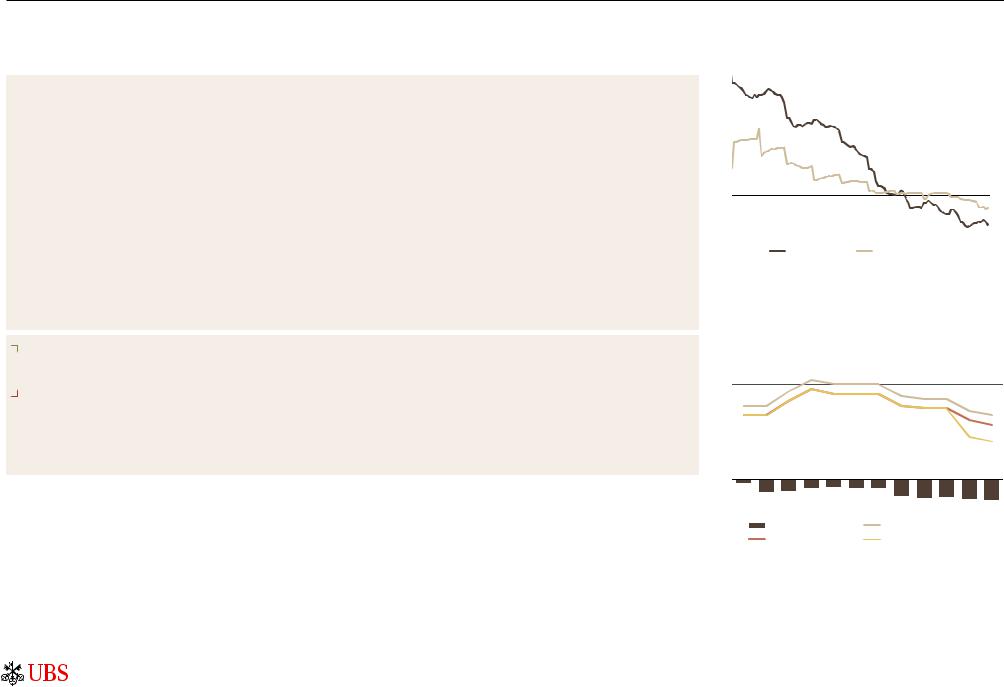
vk.com/id446425943
Chinese economy - Pressure remains despite stabilization
Key points
•Recent economic development signals ongoing downward pressure despite stabilization.
•Both monetary and fiscal policies stay supportive.
•Sino-US trade tension remains a key risk.
CIO view (Probability: 80%*) |
Stabilization on policy support |
•Recent key macro indicators showed ongoing growth pressure despite stabilization. May retail sales growth bounced to 8.6% y/y driven by auto sales and consumer staples. May credit growth stabilized at 10.5% y/y with continued policy easing. On the other hand, fixed asset investment growth decelerated to 5.6% y/y for the first five months due to slower infrastructure and property.
We expect further policy supports for the coming months to cushion slowdown.
•Monetary policy remains supportive. The central bank announced a three-step targeted reserve requirement ratio (RRR) cut for small and medium-sized banks, including 100bps each on 15 May, 17 June and 15 July. The central bank also resumed openmarket reverse repo operations and lending facilities in May. We expect another 100–200bps of broad-based RRR cuts over the rest of the year, alongside the use of lending facilities and other new tools.
•Fiscal policy remains active. Local government special bonds were allowed to be used as equity for key infrastructure projects from 11 June, to lower minimum capital requirement of such projects and boost infrastructure investment. Preferential tax policies were rolled out to the auto, insurance and software sectors.
•Sino-US trade tension remains a key risk. China and the US failed to sign a deal in May, but the bilateral negotiation continues. Neither country appears to be in a rush to reach a deal, but rising market and economic pain could eventually force the two sides back to the negotiating table. The two powers are entering a "new paradigm" likely to feature long cycles of talk-battle- talk.
Positive scenario (Probability: 10%*) |
Growth acceleration |
•GDP growth accelerates above 6.8% in 2019 on a reduction in trade tensions and a global cyclical growth upswing. Aggregate debt-to-GDP ratio stabilizes. The annual current account surplus increases over USD 100bn.
Negative scenario (Probability: 10%*)
•The US makes good on its threats to impose investment restrictions and tariffs on most Chinese products, introducing a sweeping tariff of 25% on some USD 500bn of annual Chinese imports before 2020.In 2019, China experiences a sharp slowdown in growth (5% real GDP growth for two quarters) and a faster deterioration of its current account into an annual deficit.The CNY slides to 7.5 per USD or weaker within a quarter as FX reserves fall dramatically and capital controls are tightened up.
*Scenario probabilities are based on qualitative assessments.
Key dates |
|
Jun 30 |
June manufacturing and non-manufacturing PMI |
Jul 10 |
June inflation |
Jul 15 |
2Q GDP, June fixed asset investment, retail sales, industrial production |
|
|
Investment slowed while retail sales stayed resilient
Year-to-date growth, % y/y
30
25
20
15
10
|
|
|
|
|
|
|
|
|
8.1 |
5 |
|
|
|
|
|
|
|
|
5.6 |
|
|
|
|
|
|
|
|
|
|
10 |
11 |
12 |
13 |
14 |
15 |
16 |
17 |
18 |
19 |
|
|
FAI (% y/y, ytd) |
|
|
Retail sales (% y/y, ytd) |
|
|||
Source: CEIC, UBS, as of 18 June 2019
Both monetary and fiscal policies remain supportive.
%
25
20
15
10
5
0
-5
08 |
09 |
10 |
11 |
12 |
13 |
14 |
15 |
16 |
17 |
18 |
19 |
|
Budget balance (% of GDP) |
RRR for large banks |
|
|
|||||||
|
RRR for medium banks |
|
RRR for small banks |
|
|
||||||
Source: Ministry of Finance, PBoC, CEIC, UBS estimate, as of 18 June 2019
For further information please contact CIO China economist Yifan Hu, yifan.hu@ubs.com or CIO analyst Kathy Li, kathy.li@ubs.com 14
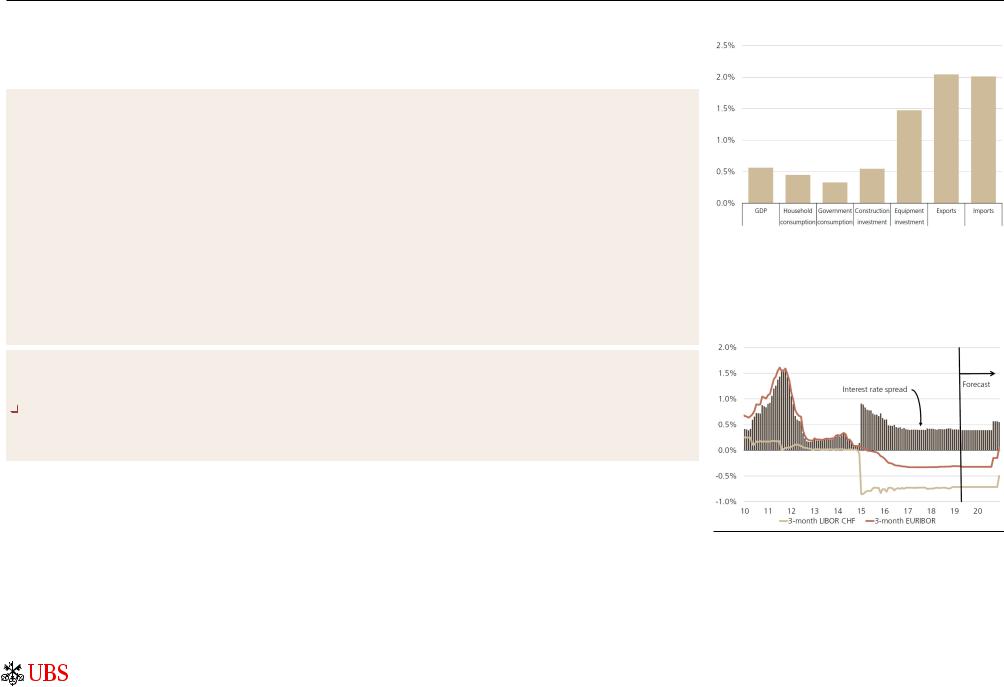
vk.com/id446425943
Swiss economy - Global uncertainty weighs on growth
Key points
•After a slowdown in the second half of 2018, Swiss GDP grew 0.6% q/q in 1Q19. We expect growth of 1.3% for the full year.
•Despite the robust growth, we remain cautious on Switzerland's economic outlook given the escalation in US-China trade tensions and ongoing political uncertainties. These risks could delay the global economic recovery and weigh on Swiss exports.
•Given these risks, we expect the Swiss National Bank (SNB) to start hiking rates only in 4Q20, after a hike by the ECB in 3Q20.
CIO view (Probability: 60%*) |
Recovery expected later in the year |
•Swiss gross domestic product (GDP) grew in the first quarter by 1.4% y/y, slightly below the long-term average. All components contributed to this robust result. In addition, GDP growth for 2H18 was revised slightly up.
•Despite the robust growth, we remain cautious on Switzerland's economic outlook given the escalation in US-China trade tensions and ongoing political uncertainties. These risks could delay the global economic recovery and weigh on Swiss exports. We expect the Swiss economy to grow 1.3% this year. In the coming quarters, we expect stable Swiss growth slightly below the long-term trend. For 2020, we forecast growth of 1.6%.
•But the picture is mixed. In May, the manufacturing purchasing managers’ index stayed below the 50 mark, indicating weak growth in the manufacturing sector for the coming quarters.
•Alongside these are factors benefiting the Swiss economy. The labor market has recovered noticeably and can be a key driver of private consumption.
•The moderate growth in the Swiss economy, and a franc that today is stronger than in 2018, will have a dampening effect on inflation this year. We expect consumer prices to grow by 0.6%, after last year's 0.9%.
•In an environment of global uncertainty and a subdued economic picture, the SNB is unlikely to hike interest rates anytime soon. We only see the first SNB rate hike in the fourth quarter of 2020, conditional upon an ECB rate hike in the quarter prior.
 Positive scenario (Probability: 15%*)
Positive scenario (Probability: 15%*)
•A further drop in Eurozone unemployment leads to a rebound in Europe and shores up domestic demand, which in turn supports Swiss exports.
Negative scenario (Probability: 25%*)
•More protectionist measures by the Trump administration (especially against European car manufacturers) lead to a global downturn, which would hurt Swiss exports.
*Scenario probabilities are based on qualitative assessment.
Key dates |
|
Jul 1 |
PMI manufacturing for June |
Jul 4 |
CPI for June |
Jul 7 |
Unemployment rate for June |
Jul 18 |
Trade balance for June |
GDP growth in 1Q19 supported by all components
Growth of GDP components q/q, in %
Source: Macrobond, UBS, as of 12 June 2019
No imminent end to the negative interest rate period
Money market interest rates in the Eurozone and Switzerland
Source: Macrobond, UBS, as of 12 June 2019
For further information please contact CIO Swiss economists Alessandro Bee, alessandro.bee@ubs.com or Sibille Duss, sibille.duss@ubs.com. 15

vk.com/id446425943
Contact List
Global Chief Investment Officer GWM
Mark Haefele mark.haefele@ubs.com
UBS CIO GWM Global Investment Office |
|
|
|
Global Asset Allocation |
Global Asset Allocation |
Investment Themes |
UHNW |
Andreas Koester |
Mark Andersen |
Philippe G. Müller |
Simon Smiles |
andreas.koester@ubs.com |
mark.andersen@ubs.com |
philippe-g.mueller@ubs.com |
simon.smiles@ubs.com |
UBS CIO GWM Regional Chief Investment Offices |
|
|
|
|
US |
APAC |
EMEA |
Switzerland |
Emerging Markets |
Mike Ryan |
Min Lan Tan |
Themis Themistocleous |
Daniel Kalt |
Jorge Mariscal |
mike.ryan@ubs.com |
min-lan.tan@ubs.com |
themis.themistocleous@ubs.com |
daniel.kalt@ubs.com |
jorge.mariscal@ubs.com |
16

vk.com/id446425943
Disclaimer
UBS Chief Investment Office's ("CIO") investment views are prepared and published by the Global Wealth Management business of UBS Switzerland AG (regulated by FINMA in Switzerland) or its affiliates ("UBS").
The investment views have been prepared in accordance with legal requirements designed to promote the independence of investment research.
Generic investment research – Risk information:
This publication is for your information only and is not intended as an offer, or a solicitation of an offer, to buy or sell any investment or other specific product. The analysis contained herein does not constitute a personal recommendation or take into account the particular investment objectives, investment strategies, financial situation and needs of any specific recipient. It is based on numerous assumptions. Different assumptions could result in materially different results. Certain services and products are subject to legal restrictions and cannot be offered worldwide on an unrestricted basis and/or may not be eligible for sale to all investors. All information and opinions expressed in this document were obtained from sources believed to be reliable and in good faith, but no representation or warranty, express or implied, is made as to its accuracy or completeness (other than disclosures relating to UBS). All information and opinions as well as any forecasts, estimates and market prices indicated are current as of the date of this report, and are subject to change without notice. Opinions expressed herein may differ or be contrary to those expressed by other business areas or divisions of UBS as a result of using different assumptions and/or criteria.
In no circumstances may this document or any of the information (including any forecast, value, index or other calculated amount ("Values")) be used for any of the following purposes (i) valuation or accounting purposes; (ii) to determine the amounts due or payable, the price or the value of any financial instrument or financial contract; or (iii) to measure the performance of any financial instrument including, without limitation, for the purpose of tracking the return or performance of any Value or of defining the asset allocation of portfolio or of computing performance fees. By receiving this document and the information you will be deemed to represent and warrant to UBS that you will not use this document or otherwise rely on any of the information for any of the above purposes. UBS and any of its directors or employees may be entitled at any time to hold long or short positions in investment instruments referred to herein, carry out transactions involving relevant investment instruments in the capacity of principal or agent, or provide any other services or have officers, who serve as directors, either to/for the issuer, the investment instrument itself or to/for any company commercially or financially affiliated to such issuers. At any time, investment decisions (including whether to buy, sell or hold securities) made by UBS and its employees may differ from or be contrary to the opinions expressed in UBS research publications. Some investments may not be readily realizable since the market in the securities is illiquid and therefore valuing the investment and identifying the risk to which you are exposed may be difficult to quantify. UBS relies on information barriers to control the flow of information contained in one or more areas within UBS, into other areas, units, divisions or affiliates of UBS. Futures and options trading is not suitable for every investor as there is a substantial risk of loss, and losses in excess of an initial investment may occur. Past performance of an investment is no guarantee for its future performance. Additional information will be made available upon request. Some investments may be subject to sudden and large falls in value and on realization you may receive back less than you invested or may be required to pay more. Changes in foreign exchange rates may have an adverse effect on the price, value or income of an investment. The analyst(s) responsible for the preparation of this report may interact with trading desk personnel, sales personnel and other constituencies for the purpose of gathering, synthesizing and interpreting market information.
Tax treatment depends on the individual circumstances and may be subject to change in the future. UBS does not provide legal or tax advice and makes no representations as to the tax treatment of assets or the investment returns thereon both in general or with reference to specific client's circumstances and needs. We are of necessity unable to take into account the particular investment objectives, financial situation and needs of our individual clients and we would recommend that you take financial and/or tax advice as to the implications (including tax) of investing in any of the products mentioned herein.
This material may not be reproduced or copies circulated without prior authority of UBS. Unless otherwise agreed in writing UBS expressly prohibits the distribution and transfer of this material to third parties for any reason. UBS accepts no liability whatsoever for any claims or lawsuits from any third parties arising from the use or distribution of this material. This report is for distribution only under such circumstances as may be permitted by applicable law. For information on the ways in which CIO manages conflicts and maintains independence of its investment views and publication offering, and research and rating methodologies, please visit www.ubs.com/research. Additional information on the relevant authors of this publication and other CIO publication(s) referenced in this report; and copies of any past reports on this topic; are available upon request from your client advisor.
Important Information about Sustainable Investing Strategies: Incorporating environmental, social and governance (ESG) factors or Sustainable Investing considerations may inhibit the portfolio manager’s ability to participate in certain investment opportunities that otherwise would be consistent with its investment objective and other principal investment strategies. The returns on a portfolio consisting primarily of ESG or sustainable investments may be lower than a portfolio where such factors are not considered by the portfolio manager. Because sustainability criteria can exclude some investments, investors may not be able to take advantage of the same opportunities or market trends as investors that do not use such criteria. Companies may not necessarily meet high performance standards on all aspects of ESG or sustainable investing issues; there is also no guarantee that any company will meet expectations in connection with corporate responsibility, sustainability, and/or impact performance.
Distributed to US persons by UBS Financial Services Inc. or UBS Securities LLC, subsidiaries of UBS AG. UBS Switzerland AG, UBS Europe SE, UBS Bank, S.A., UBS Brasil Administradora de Valores Mobiliarios Ltda, UBS Asesores Mexico, S.A. de C.V., UBS Securities Japan Co., Ltd, UBS Wealth Management Israel Ltd and UBS Menkul Degerler AS are affiliates of UBS AG. UBS Financial Services Incorporated of Puerto Rico is a subsidiary of UBS Financial Services Inc. UBS Financial Services Inc. accepts responsibility for the content of a report prepared by a non-US affiliate when it distributes reports to US persons. All transactions by a US person in the securities mentioned in this report should be effected through a US-registered broker dealer affiliated with UBS, and not through a non-US affiliate. The contents of this report have not been and will not be approved by any securities or investment authority in the United States or elsewhere. UBS Financial Services Inc. is not acting as a municipal advisor to any municipal entity or obligated person within the meaning of Section 15B of the Securities Exchange Act (the "Municipal Advisor Rule") and the opinions or views contained herein are not intended to be, and do not constitute, advice within the meaning of the Municipal Advisor Rule.
External Asset Managers / External Financial Consultants: In case this research or publication is provided to an External Asset Manager or an External Financial Consultant, UBS expressly prohibits that it is redistributed by the External Asset Manager or the External Financial Consultant and is made available to their clients and/or third parties. Austria: This publication is not intended to constitute a public offer under Austrian law, but might be distributed for information purposes to clients of UBS Europe SE, Niederlassung Österreich, with place of business at Wächtergasse 1, A-1010 Wien. UBS Europe SE, Niederlassung Österreich is a branch of UBS Europe SE, a credit institution constituted under German law in the form of a Societas Europaea, duly authorized by the German Federal Financial Services Supervisory Authority (Bundesanstalt für Finanzdienstleistungsaufsicht), to which this publication has not been submitted for approval. Bahrain: UBS is a Swiss bank not licensed, supervised or regulatedAnchor in Bahrain by the Central Bank of Bahrain and does not undertake banking or investment business activities in Bahrain. Therefore, clients have no protection under local banking and investment services laws and regulations. Brazil: Distributed by UBS Brasil Administradora de Valores Mobiliários Ltda. and/or by UBS Consenso Investimentos Ltda., entities regulated by Comissão de Valores Mobiliários ("CVM"). Canada: In Canada, this publication is distributed to clients of UBS Wealth Management Canada by UBS Investment Management Canada Inc.. China: This report is prepared by UBS AG or its offshore subsidiary or affiliate (collectively as "UBS Offshore"). UBS Offshore is an entity incorporated out of China and is not licensed, supervised or regulated in China to carry out banking or securities business. The recipient should not contact the analysts or UBS Offshore which produced this report for advice as they are not licensed to provide securities investment advice in China. UBS Investment Bank (including Research) has its own wholly independent research and views which at times may vary from the views of UBS Global Wealth Management. This report shall not be regarded as providing specific securities related analysis. The recipient should not use this document or otherwise rely on any of the information contained in this report in making investment decisions and UBS takes no responsibility in this regard. Czech Republic: UBS is not a licensed bank in the Czech Republic and thus is not allowed to provide regulated banking or investment services in the Czech Republic. Please notify UBS if you do not wish to receive any further correspondence. Denmark: This publication is not intended to constitute a public offer under Danish law, but might be distributed by UBS Europe SE, Denmark Branch, filial af UBS Europe SE, with place of business at Sankt Annae Plads 13, 1250 Copenhagen, Denmark, registered with the Danish Commerce and Companies Agency, under the No. 38 17 24 33. UBS Europe SE, Denmark Branch, filial af UBS Europe SE is a branch of UBS Europe SE, a credit institution constituted under German law in the form of a Societas Europaea, duly authorized by the German Federal Financial Supervisory Authority (Bundesanstalt für Finanzdienstleistungsaufsicht, BaFin). UBS Europe SE, Denmark Branch, filial af UBS Europe SE is subject to the joint supervision of the BaFin, the central bank of Germany (Deutsche Bundesbank) and the Danish Financial Supervisory Authority (DFSA) (Finanstilsynet), to which this document has not been submitted for approval. France: This publication is distributed by UBS (France) S.A., French "société anonyme" with share capital of € 132.975.556, 69, boulevard Haussmann F-75008 Paris, R.C.S. Paris B 421 255 670, to its clients and prospects. UBS (France) S.A. is a provider of investment services duly authorized according to the terms of the "Code Monétaire et Financier", regulated by French banking and financial authorities as the "Autorité de Contrôle Prudentiel et de Résolution". Germany: This publication is distributed to clients of UBS Europe SE, with registered office at Bockenheimer Landstrasse 2-4, 60323 Frankfurt am Main, an entity supervised by the Bundesanstalt für Finanzdienstleistungsaufsicht. Greece: UBS Switzerland AG and its affiliates (UBS) are not licensed as a bank or financial institution under Greek legislation and do not provide banking and financial services in Greece. Consequently, UBS provides such services from branches outside of Greece, only. This document may not be considered as a public offering made or to be made to residents of Greece. Hong Kong: This publication is distributed to clients of UBS AG Hong Kong Branch by UBS AG Hong Kong Branch, a licensed bank under the Hong Kong Banking Ordinance and a registered institution under the Securities and Futures Ordinance. India: Distributed by UBS Securities India Private Ltd. 2/F, 2 North Avenue, Maker Maxity, Bandra Kurla Complex, Bandra (East), Mumbai (India) 400051. Phone: +912261556000. SEBI Registration Numbers: NSE (Capital Market Segment): INB230951431, NSE (F&O Segment) INF230951431, BSE (Capital Market Segment) INB010951437. Indonesia, Malaysia, Philippines, Thailand: This material was provided to you as a result of a request received by UBS from you and/or persons entitled to make the request on your behalf. Should you have received the material erroneously, UBS asks that you kindly destroy/
it and inform UBS immediately. Any and all advice provided and/or trades executed by UBS pursuant to the material will only have been provided upon your specific request or executed upon your specific instructions, as the case may be, and may be deemed as such by UBS
17

vk.com/id446425943
Disclaimer
and you. The material may not have been reviewed, approved, disapproved or endorsed by any financial or regulatory authority in your jurisdiction. The relevant investments will be subject to restrictions and obligations on transfer as set forth in the material, and by receiving the material you undertake to comply fully with such restrictions and obligations. You should carefully study and ensure that you understand and exercise due care and discretion in considering your investment objective, risk appetite and personal circumstances against the risk of the investment. You are advised to seek independent professional advice in case of doubt. Italy: This publication is distributed to clients of UBS Europe SE, Succursale Italia, Via del Vecchio Politecnico, 3 - 20121 Milano, branch of UBS Europe SE, a German bank duly authorized by the “Bundesanstalt für Finanzdienstleistungsaufsicht” (BaFin) to the provision of financial services, supervised by both BaFin and"Consob". Jersey: AnchorUBS AG, Jersey Branch, is regulated and authorized by the Jersey Financial Services Commission for the conduct of banking, funds and investment business. Where services are provided from outside Jersey, they will not be covered by the Jersey regulatory regime. UBS AG, Jersey Branch is a branch of UBS AG a public company limited by shares, incorporated in Switzerland whose registered offices are at Aeschenvorstadt 1, CH-4051 Basel and Bahnhofstrasse 45, CH 8001 Zurich. UBS AG, Jersey Branch's principal place business is 1, IFC Jersey, St Helier, Jersey, JE2 3BX. Luxembourg: This publication is not intended to constitute a public offer under Luxembourg law, but might be distributed for information purposes to clients of UBS Europe SE, Luxembourg Branch, with place of business at 33A, Avenue J. F. Kennedy, L-1855 Luxembourg. UBS Europe SE, Luxembourg Branch is a branch of UBS Europe SE, a credit institution constituted under German law in the form of a Societas Europaea, duly authorized by the German Federal Financial Services Supervisory Authority (Bundesanstalt für Finanzdienstleistungsaufsicht, BaFin), and is subject to the joint supervision of BaFin, the central bank of Germany (Deutsche Bundesbank), as well as of the Luxembourg supervisory authority, the Commission de Surveillance du Secteur Financier (the "CSSF"), to which this publication has not been submitted for approval. Mexico: This information is distributed by UBS Asesores México, S.A. de C.V. ("UBS Asesores"), an affiliate of UBS Switzerland AG, incorporated as a non-independent investment advisor under the Securities Market Law due to the relation with a Foreign Bank. UBS Asesores is a regulated entity and it is subject to the supervision of the Mexican Banking and Securities Commission ("CNBV"), which exclusively regulates UBS Asesores regarding the rendering of portfolio management, as well as on securities investment advisory services, analysis and issuance of individual investment recommendations, so that the CNBV has no surveillance faculties nor may have over any other service provided by UBS Asesores. UBS Asesores is registered before CNBV under Registry number 30060. You are being provided with this UBS publication or material because you have indicated to UBS Asesores that you are a Sophisticated Qualified Investor located in Mexico. The compensation of the analyst(s) who prepared this report is determined exclusively by research management and senior management of any entity of UBS Group to which such analyst(s) render services. Nigeria: UBS Switzerland AG and its affiliates (UBS) are not licensed, supervised or regulated in Nigeria by the Central Bank of Nigeria (CBN) or the Nigerian Securities and Exchange Commission (SEC) and do not undertake banking or investment business activities in Nigeria. Portugal: UBS Switzerland AG is not licensed to conduct banking and financial activities in Portugal nor is UBS Switzerland AG supervised by the portuguese regulators (Bank of Portugal "Banco de Portugal" and Portuguese Securities Exchange Commission "Comissão do Mercado de Valores Mobiliários"). Singapore: This material was provided to you as a result of a request received by UBS from you and/or persons entitled to make the request on your behalf. Should you have received the material erroneously, UBS asks that you kindly destroy/delete it and inform UBS immediately. Clients of UBS AG Singapore branch are asked to please contact UBS AG Singapore branch, an exempt financial adviser under the Singapore Financial Advisers Act (Cap. 110) and a wholesale bank licensed under the Singapore Banking Act (Cap. 19) regulated by the Monetary Authority of Singapore, in respect of any matters arising from, or in connection with, the analysis or report.. Spain: This publication is distributed to its clients by UBS Europe SE, Sucursal en España, with registered office at Calle María de Molina 4, C.P. 28006, Madrid, entity supervised by the Bundesanstalt für Finanzdienstleistungsaufsicht (BaFin) and Banco de España, to which this publication has not been submitted for approval. Additionally it is authorized to provide investment services on securities and financial instruments, regarding which it is supervised by the Commission Nacional del Mercado de Valores (CNMV) as well. UBS Europe SE, Sucursal en España is a branch of UBS Europe SE, a credit institution constituted under German law in the form of a Societas Europaea duly authorized and regulated by BaFin. Sweden: This publication is not intended to constitute a public offer under Swedish law, but might be distributed by UBS Europe SE, Sweden Bankfilial with place of business at Regeringsgatan 38, 11153 Stockholm, Sweden, registered with the Swedish Companies Registration Office under the Reg. No 516406-1011. UBS Europe SE, Sweden Bankfilial is a branch of UBS Europe SE, a credit institution constituted under German law in the form of a Societas Europaea, duly authorized by the German Federal Financial Supervisory Authority (Bundesanstalt für Finanzdienstleistungsaufsicht, BaFin). UBS Europe SE, Sweden Bankfilial is subject to the joint supervision of the BaFin, the central bank of Germany (Deutsche Bundesbank) and the Swedish financial supervisory authority (Finansinspektionen), to which this document has not been submitted for approval. Taiwan: This material is provided by UBS AG, Taipei Branch in accordance with laws of Taiwan, in agreement with or at the request of clients/prospects. UAE: UBS is not licensed in the UAE by the Central Bank of UAE or by the Securities & Commodities Authority. The UBS AG Dubai Branch is licensed in the DIFC by the Dubai Financial Services Authority as an authorised firm. UK: Approved by UBS Switzerland AG, authorised and regulated by the Financial Market Supervisory Authority in Switzerland. In the United Kingdom, UBS Switzerland AG is authorised by the Prudential Regulation Authority and subject to regulation by the Financial Conduct Authority and limited regulation by the Prudential Regulation Authority. Details about the extent of our regulation by the Prudential Regulation Authority are available from us on request. A member of the London Stock Exchange. This publication is distributed to retail clients of UBS London in the UK. Where products or services are provided from outside the UK, they will not be covered by the UK regulatory regime or the Financial Services Compensation Scheme.
Version 04/2019. CIO82652744
© UBS 2019.The key symbol and UBS are among the registered and unregistered trademarks of UBS. All rights reserved.
18
